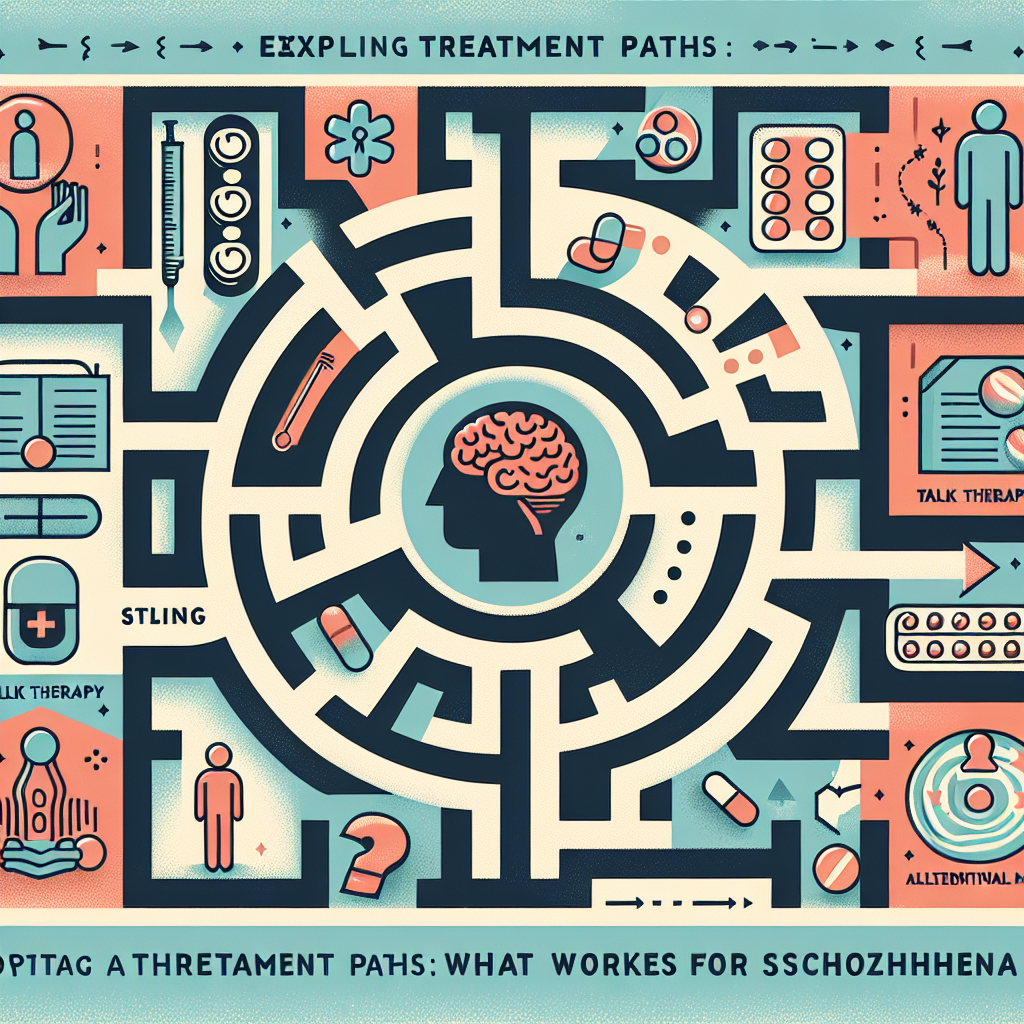
Exploring Treatment Paths: What Works Best for Schizophrenia? The Ultimate Guide to Effective Strategies
Introduction
Schizophrenia, a complex and often debilitating mental health condition characterized by distorted thinking, perception, emotions, language, and sense of self, affects millions across the globe. While its symptoms can be profoundly disruptive, the good news is that effective treatment options abound. In this article, we delve into Exploring Treatment Paths: What Works Best for Schizophrenia? by investigating varied therapeutic approaches, evidence-based practices, and real-world case studies to help individuals make informed choices about their mental health care.
With advancements in our understanding of schizophrenia and the development of new treatments, it has become increasingly vital for patients and their families to explore these available paths actively. This complex journey doesn’t merely revolve around medications; it also encompasses psychotherapy, support networks, lifestyle adaptations, and holistic treatments. Together, we will uncover a world of possibilities that can illuminate the path to recovery and empower those affected by schizophrenia.
Understanding Schizophrenia: The Landscape of Treatment
Symptoms and Diagnosis
Before delving into treatment paths, it’s essential to grasp the nature of schizophrenia. Symptoms typically include:
- Positive symptoms (hallucinations, delusions, thought disorders)
- Negative symptoms (absence of normal emotional responses, social withdrawal)
- Cognitive symptoms (poor concentration, memory issues)
Recognizing these symptoms is the first step toward obtaining an accurate diagnosis from a trained mental health professional. Early intervention can drastically change outcomes and improve the quality of life for individuals diagnosed with schizophrenia.
Traditional Approaches: Medication Management
Antipsychotic Medications
The cornerstone of schizophrenia treatment often involves antipsychotic medications. These can be broadly categorized into:
First-Generation (Typical) Antipsychotics
- Examples: Haloperidol, Chlorpromazine
- Benefits: Effective for acute psychotic symptoms
- Limitations: Extrapyramidal side effects, including tremors and rigidity
- Second-Generation (Atypical) Antipsychotics
- Examples: Risperidone, Olanzapine, Aripiprazole
- Benefits: Less emphasis on extrapyramidal symptoms; helps with some negative symptoms
- Limitations: Weight gain and metabolic syndrome risk
Case Study: Daniel’s Journey with Medication Management
Daniel, diagnosed with schizophrenia at 22, struggled with debilitating hallucinations and delusions. After trying a first-generation antipsychotic, he experienced severe side effects, leading his psychiatrist to switch him to an atypical antipsychotic. This change significantly improved his functioning and quality of life.
Medication Adherence
An often-overlooked element in the treatment of schizophrenia is medication adherence. Studies indicate that nearly 50% of individuals do not consistently take their medications as prescribed. Thus, developing an adherence strategy tailored to individual lifestyles is crucial.
Psychotherapy: Addressing the Psychological Components
While medication provides symptomatic relief, psychotherapy plays an equally vital role in treating schizophrenia.
Cognitive Behavioral Therapy (CBT)
Cognitive Behavioral Therapy (CBT) helps individuals develop coping mechanisms, challenge distorted thinking, and address the emotional and behavioral components of their condition.
Case Study: Alex’s Therapeutic Journey
Alex had been experiencing negative symptoms that severely limited his social interactions. Through regular CBT sessions, he learned to confront and reframe his negative thoughts, notably improving his ability to engage in social settings and reducing his feelings of isolation.
Supportive Therapy and Family Therapy
Integrating family members into therapy can illuminate patterns of communication that may exacerbate symptoms. Supportive therapy focuses on enhancing coping strategies and stress management.
Lifestyle Modifications: The Essential Complement
Embracing a holistic approach can significantly impact overall well-being.
Nutrition and Physical Health
Proper nutrition and regular physical activity can promote physical and mental health. Nutrients such as omega-3 fatty acids, found in fish, and antioxidants found in fruits and vegetables may have beneficial effects on brain health.
Case Study: Emily’s Holistic Approach
Emily sought treatment for her schizophrenia and decided to incorporate dietary changes along with her medication regimen. She reported a notable improvement in mood and cognitive function, feeling empowered by her health choices.
Mindfulness and Stress Reduction
Mindfulness practices, including yoga and meditation, have shown promise in reducing stress and enhancing emotional regulation.
Peer Support and Community Resources
Peer support through community organizations can provide vital resources and a sense of belonging.
Support Groups
Participants often report feeling less isolated and more understood, leading to reciprocal benefits among group members.
Case Study: Group Therapy Transformation
John joined a local support group after facing recurrent relapses. Connecting with others who shared similar experiences provided him with insights and tools that helped stabilize his condition over time.
Exploring Treatment Paths: What Works Best for Schizophrenia? An Integrated Approach
The Importance of Personalized Treatment
Every individual’s experience with schizophrenia is unique. Personalized treatment plans that incorporate medication, psychotherapy, lifestyle changes, and community support can significantly enhance effectiveness. Collaboration between healthcare providers, patients, and families is paramount in establishing a comprehensive approach.
Innovative and Emerging Therapies
Neuromodulation Techniques
Emerging research into neuromodulation—like transcranial magnetic stimulation (TMS) and electroconvulsive therapy (ECT)—offers hope for patients with treatment-resistant schizophrenia.
Case Study: Michael’s Experience with TMS
Michael had struggled with treatment-resistant schizophrenia for years, but after participating in TMS therapy, he experienced a substantial reduction in symptoms, allowing him to regain control over his life.
The Role of Technology
With the proliferation of telehealth platforms, patients can access care and therapeutic support from the comfort of their homes. Mobile applications for tracking symptoms, medication schedules, and mood changes also provide innovative support tools.
Conclusion
Navigating the labyrinth of schizophrenia treatment can be daunting, yet Exploring Treatment Paths: What Works Best for Schizophrenia? reveals that effective strategies do exist. By embracing a multi-faceted approach that includes medications, psychotherapy, lifestyle modifications, and community resources, individuals can lead fulfilling lives.
Key Takeaways
- Each treatment path is unique, necessitating personalized care.
- Medication remains a foundation but must be complemented by therapeutic resources.
- Lifestyle and community support are integral to overall wellness.
- Emerging and innovative therapies offer new hope for individuals struggling with treatment-resistant symptoms.
As we acknowledge the complexities of schizophrenia, let’s remain optimistic and empowered—after all, every journey is a step toward recovery.
FAQs
1. What are the early signs of schizophrenia?
Common early signs include social withdrawal, changes in behavior, unusual thoughts or beliefs, and perceptual disturbances like hearing voices.
2. How long does schizophrenia treatment typically last?
Treatment for schizophrenia is often lifelong, but the duration and type of treatment can vary widely based on individual needs and symptom management.
3. Can someone with schizophrenia learn to manage their symptoms?
Yes! Many individuals develop coping strategies through therapy and lifestyle adjustments, significantly enhancing their quality of life.
4. Is there a cure for schizophrenia?
Currently, there is no cure, but many effective treatments are available that can help individuals manage their symptoms and lead fulfilling lives.
5. How can family members support a loved one with schizophrenia?
Maintaining open communication, encouraging adherence to treatment, and participating in family therapy can provide a structured and supportive environment.
In a world where mental health conversations are becoming increasingly prevalent, remember that help is available, and recovery is possible. Let’s continue to support one another on this journey toward understanding and acceptance.

















